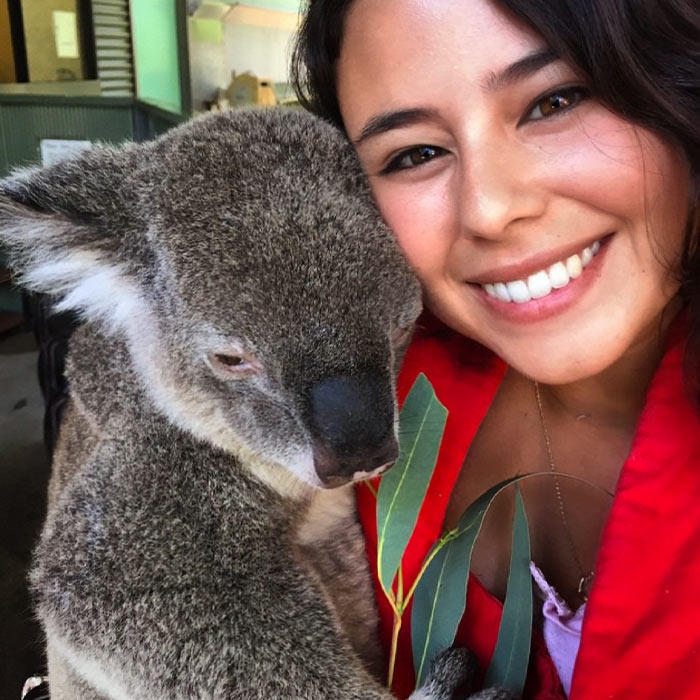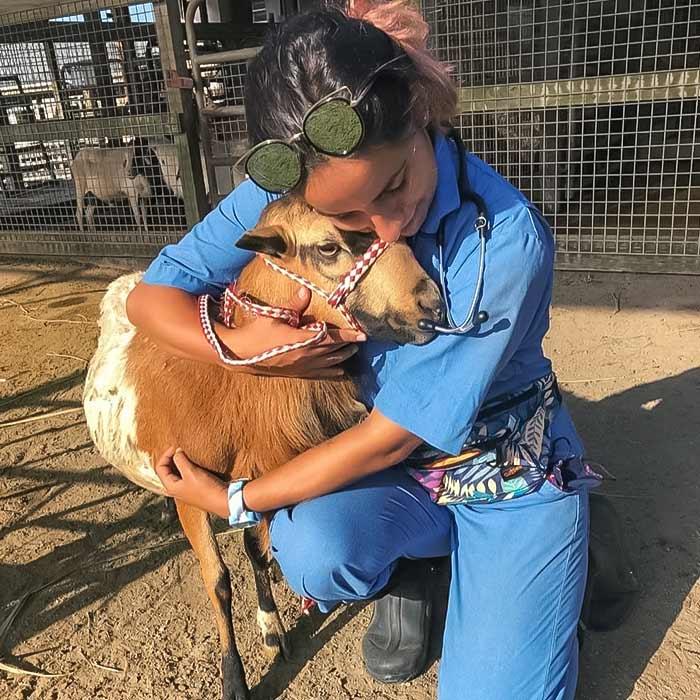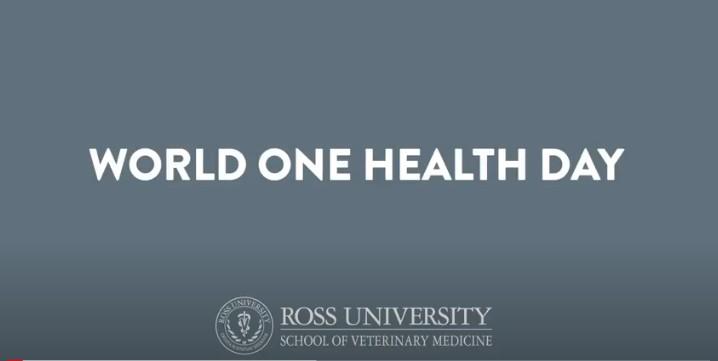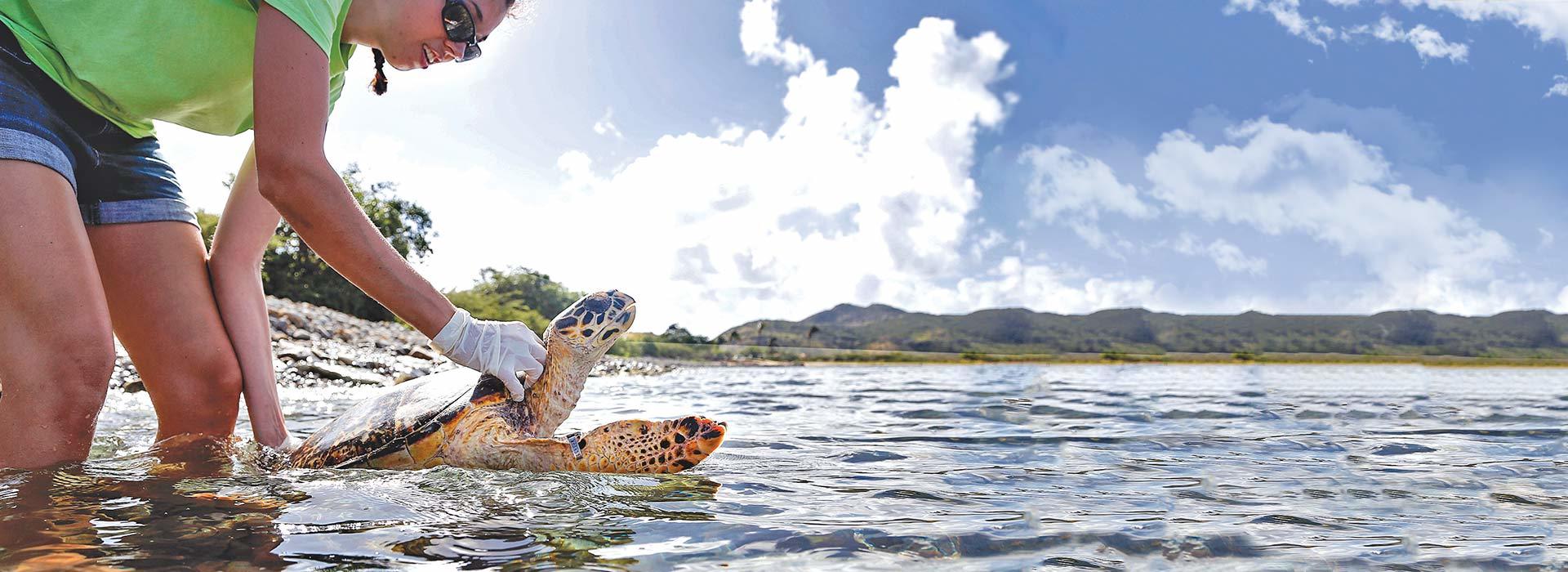ONE HEALTH
One Health is an approach to understanding the interconnectivity of humans, animals, and the environment, and achieving the best health results for all. One Health initiatives are being supported by global organizations such as the World Health Organization (WHO), Centers for Disease Control and Prevention (CDC), the U.S. Food and Drug Administration (FDA), and more.
WHAT ROLE DO VETERINARIANS HAVE IN ONE HEALTH?
Veterinary professionals are already at the center of managing animal health, human health, environmental health continuum. The veterinary One Health approach includes:
- Treating diseases that impact animals and their owners
- Working alongside animal rehabilitators to evaluate and care for injured or sick wildlife
- Addressing risk factors in agriculture and food animal safety
- Maintaining animal immunization regimens
- Implementing parasite control programs
- Advising on the risks of animal contact for immunocompromised individuals
- Promoting the benefits of the human-animal bond for various populations
In addition to these direct services, veterinary professionals report disease events and trends to state public health and regulatory agencies, collaborate with human medical counterparts on zoonotic diseases, and advise local health boards and commissions.
According to the Centers for Disease Control and Prevention, six out of every 10 known infectious diseases in people can be spread from animals. These include well-known illnesses such as HIV-AIDS, tuberculosis, plague and influenza virus. If we can detect and identify outbreaks of such diseases in animals, we will be more likely to reduce their impact on the human population. In a sense, animals can serve as the “watchmen” of disease spread for humans. It is part of the job of the veterinary medicine profession to ring the alarm bells on the human side of health care to ensure accurate diagnoses are being made in the human population in the area.
ONE HEALTH AT RUSVM
RUSVM provides a learning environment that prepares our students to become leaders in worldwide public and professional healthcare supported by a research-informed educational experience. With a focus on advancing both human and animal health, the One Health approach is at the core of our veterinary curriculum and is the focus of our veterinarian training and research centers.
While veterinary public health and epidemiology are a part of the core DVM curriculum, RUSVM offers several One Health-related electives for its DVM students:
- Introduction to One Health & Systems Approaches
- Disaster Management
- Special Topics in Research
- Parasitic Zoonoses
- Lab Animal Medicine
The Introduction to One Health & Systems Approaches and Disaster Management electives are part of the core MSc in One Health and Certificate in One Health curriculums. Because the One Health teaching approach focuses on the integration of diverse backgrounds, these electives allow DVM students to participate in assignments, discussions, and group projects with Postgraduate students from a variety of professional backgrounds, including those working in public health and human medicine.
RUSVM offers two standalone, online postgraduate programs designed to equip students with an in-depth understanding of the principles and issues associated with One Health.
MSc in One Health
The MSc in One Health online degree program can be completed in 2-3 years with part-time study. This course-based program includes an integrated capstone research project, where students have an opportunity to undertake meaningful, hands-on research that advances human, animal, and environmental health.
Certificate in One Health
The online Certificate in One Health is a 15-credit program designed for professionals who want to enhance their careers with working knowledge relevant to One Health. It is well-suited for those working in public health, veterinary medicine, human medicine, and environmental/conservation health.
RUSVM’s research is focused on advancing the health of both humans and animals. Our research team is comprised of faculty from across the globe—many with experience at international agencies such as the World Health Organization. Our institution provides opportunities for our students to engage in research and benefit from being taught by research leaders in their field.
Students wishing to get involved with One Health-related research may do so through various opportunities on campus. These opportunities include:
- Becoming a Research Assistant or Research Volunteer
- Undertaking the Special Topics in Research Elective Credit Program
- Enrolling in RUSVM’s DVM/MSc by Research Dual Degree Program
International One Health Day is celebrated annually around the world on November 3. Around this time, RUSVM hosts a One Health Day Community Fair to promote the health and wellness of animals and humans alike within the St. Kitts community. Faculty, staff, and students join community organizations and partners for a public event to raise awareness around One Health initiatives, including:
- Wildlife conservation
- Sustainability and pollution
- Domestic animal care
- Island agriculture
- Community health and wellness

Our One Health approach facilitates the implementation of research across all facets of disease, and it is the theme of our largest Research Center. The One Health Center for Zoonoses and Tropical Veterinary Medicine focuses on research aimed at understanding and combating zoonotic, vector-borne and other infectious diseases affecting human and animal health. Other areas of focus include antimicrobial and anthelmintic resistance, health management of livestock, and fish food and feed safety.
Frequently Asked Questions
Public health focuses on preventing disease, prolonging life, and promoting the health of humans and their communities. One Health, on the other hand, broadens the public health approach by additionally encompassing veterinary medicine and the environment. One Health recognizes that the health of people is connected to the health of animals and the environment and aims to achieve optimal health outcomes for all.
There is the acknowledgement that both animals and humans are up against many of the same diseases, and the challenges they present. It is estimated that zoonoses are responsible for 2.5 billion cases of human illness and 2.7 million human deaths worldwide each year. 1 Six out of every 10 infectious diseases in people are zoonotic, which makes it crucial that communities strengthen their capabilities to prevent and respond to these diseases. 2
No one discipline or sector has enough knowledge and resources to prevent the emergence or resurgence of diseases in today's globalized world. Through the One Health approach, current and potential animal, human, and environmental threats can be addressed through collaborative team solutions.
1 Gebreyes WA, Dupouy-Camet J, Newport MJ, Oliveira CJ, Schlesinger LS, Saif YM, et al. The global One Health paradigm: challenges and opportunities for tackling infectious diseases at the human, animal, and environment interface in low-resource settings. PLoS Negl Trop Dis. 2014;8:e3257. DOI
2 https://www.cdc.gov/onehealth/basics/zoonotic-diseases.html
Zoonotic diseases, otherwise known as “zoonoses,” are diseases spread between animals and humans. These can be caused by viruses, bacteria, parasites, and fungi, and cause many types of illnesses in both people and animals. Several zoonoses, while initially transmitted from animals to humans, can later spread directly from human to human, such as Ebola, ringworm, or the plague.
Some common and well-known examples of zoonotic diseases are:
- Anthrax
- Coronavirus
- Dengue fever
- Ebola
- Lyme disease
- Malaria
- Rabies
- Swine flu
- West Nile virus
- Yellow fever
- Zika virus
The One Health approach has the potential to aid human health in many ways. Some of these include:
Comparative Medicine
Different animals sometimes experience the same illnesses we do, even in identical ways. Studying animals with certain diseases allows researchers to better understand the implications for humans.
Disease Control
Zoonoses are diseases that can be transmitted from animals to humans. Coronavirus, Rabies, West Nile virus, and Lyme disease are all examples. A veterinary professional can alert human health and environmental health professionals if they are seeing a disease trend and may be able to initiate community prevention and screening measures. Even if physicians have the necessary tools to treat these ailments in humans, collaborating with veterinarians is more likely to yield a lasting solution.
Antibiotic Use
The FDA has acknowledged the important role veterinary professionals play in food production and minimizing animal antibiotic use. When food animals are given antibiotics, the resulting drug-resistant bacteria can make its way into our food supply. When treating an infection, humans may find antibiotics ineffective due to bacterial resistance.







